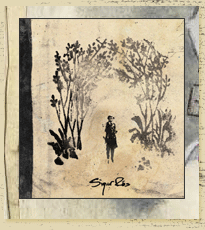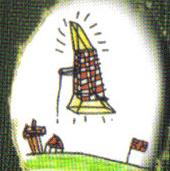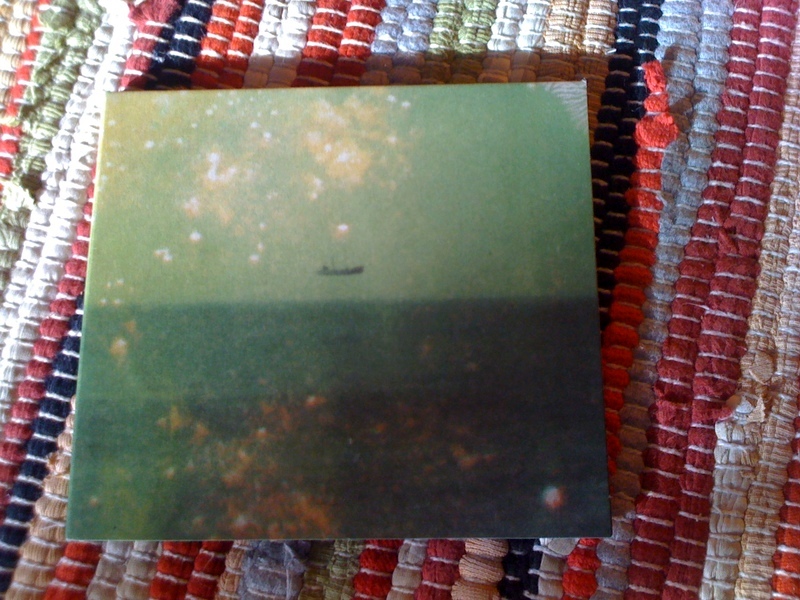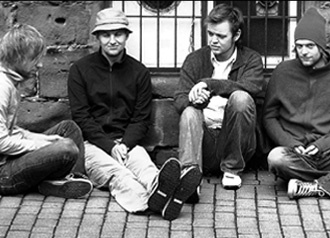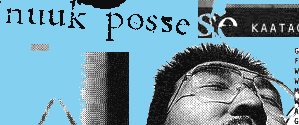| |||||||||||||||||
Instead of the glaciers and erupting volcanoes of Takk, or the swinging urban sounds of Með Suð i Eyrum, the imagery on this album is suburban and homely: one might picture the suburbs of Reykjavik on a crystalline night, lights twinkling down in the harbor, and a light drizzle falling. That's entirely fine with me, because my life has also been suburban of late... Encounters with the wilderness are middle class, rather than medieval: Varðeldur sounds like a camping trip with a couple of SUVs parked in the distance, and a whole pack of sirens prowling around in the dark. The next day, drive one of those SUVs back to Reykjavik on what passes for an Icelandic freeway, and what kind of freeway pop would you expect to hear on the radio: Rembihnutur!
I remember the disappointment I felt when I first purchased ( ), living in Tokyo in 2003. Compared to the band's previous material, the slow processions on that album seemed bleak, and somewhat dull. It took me a full three years to appreciate that album, but when I finally got it, it blew me away. Valtari is probably destined to have a similar impact on me, once I grow the ears to hear it properly. Some albums are catchy and some albums are creepers; Valtari is most definitely a creeper!
Reviewers keep asking where is the liftoff, while lamenting the formless, worldless expanses of the final songs. But maybe the escape these critics are looking for lies right there, in that liberation from form and the final remnants of the Delta blues.
In Valtari, the title track, it sounds as if the band have broken through gravity at last, to coast through deep space, with nary a drum kit or electric guitar in earshot. That is one interpretation of the song. Curiously, it changes with every listen, like a kaleiodoscope gently rotating. One half-spin, and the scene could be a sun sailing through a stormy Icelandic sky...
EG ANDA: Valtari opens with the sound of breathing, suggesting a newborn just arrived in physical form, surrounded (and heralded) by a choir of angels. The breathing reminds one of the heartbeat which throbbed early on in Ágætis Byrjun, and the heart decorations on that album's cover (was it an angel dragging a bunch of hearts? I will have to go and check!) It is a very Nordic kind of breath we hear here, though... a Viking kind of breath! The choir forms an often ghostly backdrop to the album. But there is more to it than that... as David Zeitlin has pointed out in one his reviews: "Jónsi's singing belongs to a long Scandinavian tradition of priest-ridden choirboys that includes King Diamond - the former, angelic; the latter, satanic.” And remember, Iceland is Christian on top of its pagan. At the 1.57 minute break, the choir dies away, and there's an odd rattling of metal, like a clunky old engine rattling to life... perhaps it is the engine of the valtari, the steamroller which is driving this album! But this valtari, it's a creaky old thing. It's what they might call a ponkotsu in Japan... a heap of junk.
EKKI MUKK: Like a Zen koan, Ekki Mukk asks itself the question: How do you convey the sound of no sound? Quivering strings, and a buzzing silence open this track, with a nervous tension like that nervous chapter from James Joyce's Ulyssis. The song sounds like an explosion in slow motion, each shard flying out, tumbling, into an exquisite void. 'We're not selling out, we're just older, happier. Just as honest about our happiness now as our unhappiness then. "We rented a house in the Icelandic countryside to compose it in isolation, and then we had two weeks to record it in New York: a huge city so full of people and life. This album is definitely fun.”
DAUDALOGN: The song begins with the breathing of EG ANDA returning... with what could be the sound of flowing water? .mtv.com/news/articles/1590354/20080702/sigur_ros.jhtml">Sigur Ros let loose -- on MTV. I never thought it was possible to convey that much emotion through music alone. From the opening seconds of the album, it sounds and feels like a sun or star starting to form in front of you -- and the star starts to send out fluctuating waves of sound which just melt you, instantaneously. I couldn't even get out of my seat, because I was floored by the power and intensity of the songs which followed.




c o n t i n e n t a l + d r i f t
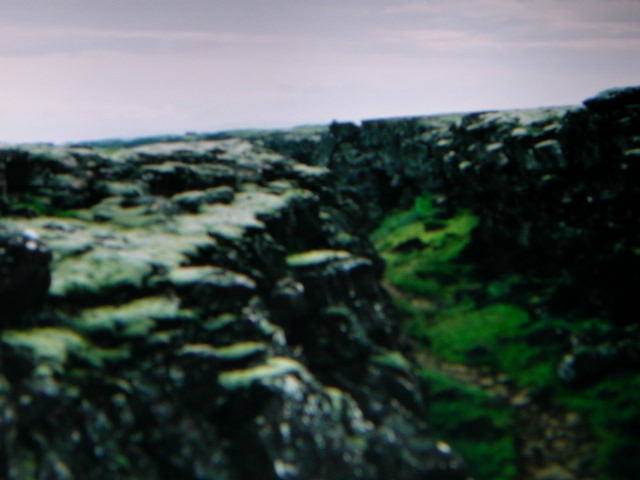 LIKE THEIR COUNTRYFELLOWS BJORK AND THE BAND MÚM, SIGUR RÓS HAVE A KNACK OF CONSTRUCTING EPIC MASTERPIECES OUT OF THE MINIATURE OF EVERYDAY LIFE. Their seminal track Ágætis Byrjun for example, from the album of the same name, brims with a cauldron of lethal emotions, and overflows with bigger-than-life sensualities. Sensei's Skilin Eftir. Or check out this gorgeous song by Rainboygirl (Zachary. For the modern Icelandic freeway pop song, here it is: Sober and Cleen by Better Way. For the epic mundanity of daily life chill out tune with soaring angelic vocals and jangling guitars and synthes and accordiums, pounding drums and reverb (but it is not Sigur Ros), hit up this My Space video. For North Atlantic B52s style chirupping atop perky 60s organ, click here. latest single and in the accompanying video, which can be viewed here, the band again blend epic musical delivery with a very simple, down-to-earth story. Lead singer Jónsi Birgisson's strange, sometimes ghostly, sometimes soaring angelic falsetto completes the effect -- and you couldn't get a more Epic feel. As the video opens, it is like the End of the World is Come: the sun has disappeared (but maybe it is just winter in the land of the Midnight Sun.) They meet up with some other kids on the way, traversing the breathtaking and alien Icelandic landscape, before they finally find the sun setting over what appears to be the black beach of Vík in south Iceland (although I could be wrong.) Suddenly the guitars kick into heavy mode, and at the crashing beat of a drum, the kids starts starting charging up a high cliff which overlooks the sunlit black beach. As Jónsi's vocals return in a haunting, angelic hymn of spiritual enlightenment, the kids dive off the cliff -- to find themselves not falling to their grisly deaths but rather flying, angelic, into the sunfilled sky. There is an angel inside everyone of us, that seems to be Sigur Rós's most important message. That has been the theme of many of their songs, if you look closely enough. That's why they make such epic songs out of mundane situations as people having dates in cafes.
LIKE THEIR COUNTRYFELLOWS BJORK AND THE BAND MÚM, SIGUR RÓS HAVE A KNACK OF CONSTRUCTING EPIC MASTERPIECES OUT OF THE MINIATURE OF EVERYDAY LIFE. Their seminal track Ágætis Byrjun for example, from the album of the same name, brims with a cauldron of lethal emotions, and overflows with bigger-than-life sensualities. Sensei's Skilin Eftir. Or check out this gorgeous song by Rainboygirl (Zachary. For the modern Icelandic freeway pop song, here it is: Sober and Cleen by Better Way. For the epic mundanity of daily life chill out tune with soaring angelic vocals and jangling guitars and synthes and accordiums, pounding drums and reverb (but it is not Sigur Ros), hit up this My Space video. For North Atlantic B52s style chirupping atop perky 60s organ, click here. latest single and in the accompanying video, which can be viewed here, the band again blend epic musical delivery with a very simple, down-to-earth story. Lead singer Jónsi Birgisson's strange, sometimes ghostly, sometimes soaring angelic falsetto completes the effect -- and you couldn't get a more Epic feel. As the video opens, it is like the End of the World is Come: the sun has disappeared (but maybe it is just winter in the land of the Midnight Sun.) They meet up with some other kids on the way, traversing the breathtaking and alien Icelandic landscape, before they finally find the sun setting over what appears to be the black beach of Vík in south Iceland (although I could be wrong.) Suddenly the guitars kick into heavy mode, and at the crashing beat of a drum, the kids starts starting charging up a high cliff which overlooks the sunlit black beach. As Jónsi's vocals return in a haunting, angelic hymn of spiritual enlightenment, the kids dive off the cliff -- to find themselves not falling to their grisly deaths but rather flying, angelic, into the sunfilled sky. There is an angel inside everyone of us, that seems to be Sigur Rós's most important message. That has been the theme of many of their songs, if you look closely enough. That's why they make such epic songs out of mundane situations as people having dates in cafes.
r o t a t i o n a l + s t r u c t u r e s
m u l t i p l e + c l i m a x e s
LISTENING TO TAKK..., YOU MIGHT FIND YOURSELF WONDERING: WHAT PLANET DOES THIS MUSIC COME FROM? I once met an American guy in Mumbai (India) who shared my love for Sigur Rós, and he commented that Jónsi's voice was "out of this world, like an alien". I agree with him -- Jónsi's voice sounds alien, like something from another world... but that ain't even scratching the surface of Sigur Rós's wierdness. The truth is that Iceland itself, if you ever get the chance to visit there, is an alien and otherworldly place. Going to Iceland is the next best thing to going to another planet. It is like a gateway between the Earth and the other worlds. If Sigur Rós have an alien vibe, it is only because they have grown up in and inhabit one of the more surreal pieces of the world. It comes out not only in Jónsi's voice, but in every aspect of their music.
But there is more to it than that... as David Zeitlin has pointed out in one his reviews: "Jónsi's singing belongs to a long Scandinavian tradition of priest-ridden choirboys that includes King Diamond - the former, angelic; the latter, satanic."
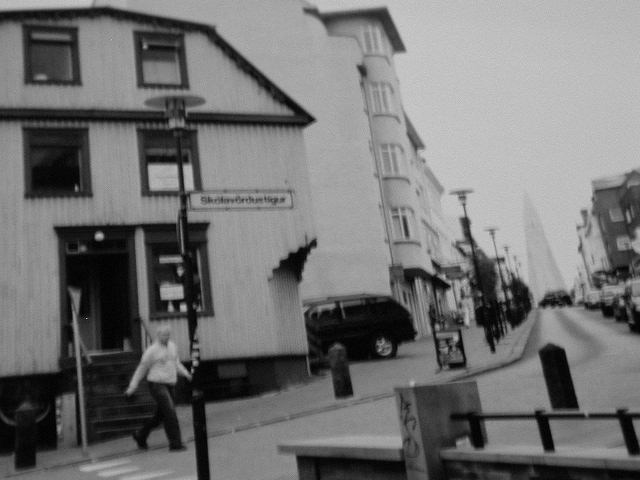 Listening to Sigur Rós's new album Takk..., the Scandinavian and Icelandic vibe is everywhere. The cover of the CD (pictured above), designed to resemble an old yellowed Victorian novel, recalls some of Múm's album covers. Difficult to say though whether Sigur Rós directly imitated Múm in this respect, or whether both bands are merely reflecting the current fashions in Icelandic graphic design. Whatever, this is a very Icelandic album, and for lovers of Iceland such as myself, it is great to notice all the Icelandic touches on this production. As Bobster says: "If there is one thing Icelandic types do well, then it has to be ambience. Their gift for the ethereal is seemingly innate. Sigur Rós are no exception to this. Glósóli has wafts of sound, that can be hard to place as any instrument in particular, running below the sweeping sounds of the falsetto vocals. That is before the last third of the song kicks in with an almightly repeated crashing which build from nothing into a furious intensity before dissapating into nothing again. It is reminiscent of the most beautiful soundscape, imagine Múm throwing a hissy fit or M83 duetting with Clannad and you may get there mentally. Glósóli is taken from the new Sigur Rós album Takk..., due out on September 12 2005. "
Listening to Sigur Rós's new album Takk..., the Scandinavian and Icelandic vibe is everywhere. The cover of the CD (pictured above), designed to resemble an old yellowed Victorian novel, recalls some of Múm's album covers. Difficult to say though whether Sigur Rós directly imitated Múm in this respect, or whether both bands are merely reflecting the current fashions in Icelandic graphic design. Whatever, this is a very Icelandic album, and for lovers of Iceland such as myself, it is great to notice all the Icelandic touches on this production. As Bobster says: "If there is one thing Icelandic types do well, then it has to be ambience. Their gift for the ethereal is seemingly innate. Sigur Rós are no exception to this. Glósóli has wafts of sound, that can be hard to place as any instrument in particular, running below the sweeping sounds of the falsetto vocals. That is before the last third of the song kicks in with an almightly repeated crashing which build from nothing into a furious intensity before dissapating into nothing again. It is reminiscent of the most beautiful soundscape, imagine Múm throwing a hissy fit or M83 duetting with Clannad and you may get there mentally. Glósóli is taken from the new Sigur Rós album Takk..., due out on September 12 2005. "
Takk... is a classic, incredible album, and it also very reminiscent of some of the Múm albums I have reviewed on this site. Just like on a Múm album, each song appeals to the child/angel in each of us, and brings out the child angel in us. As one reviewer on the Amazon site remarked: "The lyrics are small adventures, maybe like children's stories or something. I think the songs are quite simple and naive and they have a central character to them. There's one called Glósóli, and he wakes up and everything is dark outside and he can't see any light. He thinks that the sun is gone and somebody has taken it from the sky, so he makes a journey to look for the sun. He finds it in the end."




s h i m m e r i n g + v a c u u m s
 IN A CYNICAL BUT NONETHELESS INTERESTING REVIEW, JOHN DORAN WROTE ON THE PLAYLOUDER WEBSITE: "It's like the boys have suddenly hit on the exact musical formula to make you feel slightly placid (For those interested, it's this: glacial synth warble + major chord arpeggio played on xylophone + shimmering but exactly the same guitar line + enough sugary and synthetic sounds on top to induce hyper glycaemia = a drowsy yet unsatisfied feeling.) So tracks such as Hoppípolla and Með Blóðnasir blend seamlessly into one another and even if your life depended on it (and these are the sort of refrains that an average eight year old could master on their recorder given half an hour practise) you cannot recall them afterwards. They just evaporate into nothing like a brief smell of cheap perfume on a blowy day."
IN A CYNICAL BUT NONETHELESS INTERESTING REVIEW, JOHN DORAN WROTE ON THE PLAYLOUDER WEBSITE: "It's like the boys have suddenly hit on the exact musical formula to make you feel slightly placid (For those interested, it's this: glacial synth warble + major chord arpeggio played on xylophone + shimmering but exactly the same guitar line + enough sugary and synthetic sounds on top to induce hyper glycaemia = a drowsy yet unsatisfied feeling.) So tracks such as Hoppípolla and Með Blóðnasir blend seamlessly into one another and even if your life depended on it (and these are the sort of refrains that an average eight year old could master on their recorder given half an hour practise) you cannot recall them afterwards. They just evaporate into nothing like a brief smell of cheap perfume on a blowy day."
I agree, there is something very whimsical about the music of this album, and it is very hard to remember its melodies and whistle its component tunes when you are in the shower or walking down the street, regardless of how many times you have listened to them. Just like smoke, these melodies drift away into the aether. But is this a negative thing -- wouldn't Fairy Music be exactly like this: intoxicatingly beautiful, impossible to recall? Or perhaps this a new kind of music which breaks away from the verse/chorus/verse simplicity of the past, and attempts something different.
Before I continue this review, a brief breakdown of Með Suð í Eryum Við Spilum Endalaust track by track, courtesy of that amazing Reykjavík newspaper, Grapevine, and some other sources, and my own observations:
1+++ Gobbledigook
I have heard it said that the band wrote this song after watching the Eurovision Song Contest on TV. Listen to the demented La! la! la! la! la! la! la! la! la!'s which form the backing vocals in this song, and you realize this is a send up, a piss take of all the airhead wailers and la! la! la!ers of the pop industry. Gobbledigook is a Cubist pop song, the kind of pop song Picasso would have made if he were a musician... all the traditional aspects of the song (percussion, bass, vocals) deconstructed, then reconstructed in a mosiac, with no time signature -- the inside showing through the outside, and the outside in. The song opens with what I am sure is a faux hip hop guy shouting "What's up?"/techno aerobics chick responding "Are you ready?", kind of reminiscent of Mum's "I'm/9". Gobbledigook was performed rather raucuously at the recent Náttúra Concert in Laugardalur, Reykjavik, with Björk banging on the drums like a woman possessed, in the park I know so well, down near the youth hostel .
2+++ Glósóli (Glowing Sun).
This song has already been discussed enough above, but is a mighty anthem to hope.
3+++ Hoppípolla (Jumping In Puddles).
An extraordinary song, and the story of some children splashing around in a puddle and having fun (once again, simple theme turned into an epic statement of humanity and life.) This is by far the most beautiful song on the album (or at least one of the most accessible), almost too beautiful for words. It is a heroic hymn to ecstasy and spirutal joy, and also the joy of everyday things. As the song breaks into the third minute, Jónsi balances with a chorus of his own voices, each hitting a similar rhythmic high melody line, which is eventually echoed by a trumpet.
4+++ Með Blóðnasir (With A Nosebleed.)
The continuation of the previous song by other means, this is also a very powerful tune in its own right. According to the plotline, one of the kids playing in the puddle of the above song has injured himself/herself and got a nosebleed, but nobody cares because everyone is having so much fun. Played in keyboards and glockenspiel, with no clear vocals. Casper on the Sigur Rós message board said: "Með Blóðnasir is just wild! if it were an actual song it'd be the best thing they've ever done!" I just wonder whether by seperating this and Hoppípolla into two units, Sigur Rós have deliberatly tried to make it harder for both to get commercial radio playtime. Instead of selling out, the band seem to be trying to goad commercial radio into breaking a few of its own rules, and become a bit more experimental.
5+++ Se Lest (Train).
 Building straight off of Með Blóðnasir, the glockenspiel is isolated, playing a repeated melody that moves up in fifths all while bouncing in 16th notes. A slow vocal line comes over and is followed by a bass, percussion and strings all playing more drawn out chords. The light glockenspiel part drives the song and is eventually joined by what again sounds like a night-time music box. At this stage the song starts to sound very mid-1990s Bjork, as beautiful as a lullaby. Near the five-minute mark, multiple tonal instruments balance against each other, with on odd bowed instrument over the back, and light, layered vocal parts layered in, slowly joined by layered trumpets. At 6:30, incredibly curiously, we are full-fledged into a night-time polka. That's right, a freaking polka! This is cool -- only Sigur Rós could get away with putting a polka on a Rock album. Is there anything this band can't do?
Building straight off of Með Blóðnasir, the glockenspiel is isolated, playing a repeated melody that moves up in fifths all while bouncing in 16th notes. A slow vocal line comes over and is followed by a bass, percussion and strings all playing more drawn out chords. The light glockenspiel part drives the song and is eventually joined by what again sounds like a night-time music box. At this stage the song starts to sound very mid-1990s Bjork, as beautiful as a lullaby. Near the five-minute mark, multiple tonal instruments balance against each other, with on odd bowed instrument over the back, and light, layered vocal parts layered in, slowly joined by layered trumpets. At 6:30, incredibly curiously, we are full-fledged into a night-time polka. That's right, a freaking polka! This is cool -- only Sigur Rós could get away with putting a polka on a Rock album. Is there anything this band can't do?
Another opinion, from Launch: "Emphatically drawn-out at nine minutes, Sé Lest is like a vapour trail shooting across the sky from a flying glockenspiel, concluding with a marching band inadvertently trooping past the band's recording studio." And that polka band do literally troop past you as you listen, from your right to left headphones.
6+++ Illgresi (Weeds).
This is one of the best songs of the album... a timeless, almost medieval piece of pastoral awe. Curiously, the song could possibly work in a nightclub -- hear the Them Jeans remix here.
Reviewer Andy Kellman has written: "A strange thing happens before the two-minute mark in Sæglópur. All the twinkling and cooing erupts, at what might seem like eight minutes earlier than normal, into a cathartic blast of tautly constructed group noise — or, as those who prefer songs and motion over moods and atmospheres might say, "The good part comes." Sæglópur is emblematic of Sigur Rós's fourth album, released nearly three years (!) after (). Nothing resembles a drone, and no part of it could be described as funereal.
7+++ Mílanó (Milan).
According to one reviewer, "Mílanó to me is where the climax of the Takk... album kicks off. First it starts with a bit of piano, again, and soon between songs, the sound all rises and blows you away twice. You'll be worrying about the eardrums of your headphones."
8+++ Gong (Gong).
According to one reviewer, this is the only song on the album that sounds close to modern rock, and close to defining the energy of the band. In my own opinion, this is one kick-ass track -- a new direction for the band, a climax upon a climax, and another highlight of an album so crammed full of highlights.
9+++ Andvari (Waft / Zephir).
Other reviewers haven't noted it, but I swear this is another version of the same song which is featured 11 times on the () album. This is the 12th version of the song if I am correct, and I in my opinion it is the best. It is also the most moving moment of a very moving album. In the middle of the song Jónsi actually sings in English, for the first time I can remember, the simple phrase: "I love you." It brings me to tears everytime I hear it, for there is an honesty in these words, an opening of his heart -- and you feel that he is addressing the declaration at the fans of Sigur Rós, at the listeners. Some other listeners, however, have claimed this song is a declaration of love to Jónsi's new gay boyfriend. As gay love songs go, this has to be one of the best, and the most moving and powerful.
10+++ Svo Hljótt (So Quiet).
The rock bible NME said of this song: "Choice cut Svo Hljótt sounds like the bit in Lord Of The Rings when Gandalf dies reinterpreted by operatic mythical winged beasts."
refrain of key notes of one chord, we hear horns, plucked guitar and keyboards all combining for airy but understated effect. Jónsi is most clear in the vocals here, sounding, dare we say it, like an Icelandic Billy Corgan. A closing track, that sounds honest, though, again, with enough effects on the vocals that we can't quite make out the words other than "I've hayed too much!" in Icelandic.




o t h e r + c o m m e n t s
 OTHER REVIEWERS HAVE HAD THIS TO SAY ABOUT TAKK...:
OTHER REVIEWERS HAVE HAD THIS TO SAY ABOUT TAKK...:
|
|||||||||||||||||||||||||||||||||||
Writing for The Guardian, Ben Thompson wrote: "In a bold break with the self-conscious blankness of 2002's (), these 11 songs actually have titles and lyrics. More important than that, they eschew the stately meander that has been Sigur Rós's stock-in-trade for a bold commitment to the big pop chorus.
"In the past, this group have sometimes exhibited an almost paranoid determination not to make demands on their listeners, but with this record they have started to make demands on themselves. Not in the way the final track on their last, stop-gap release (three songs for avant-garde choreographer Merce Cunningham to get people dancing to) suggested they might -- by hiding Stanley knives in the frosted candy floss -- but by tightening their happy-clappy focus so the euphoria generated by their music seems to relate directly to the world people actually live in, rather than some elvish fantasy realm."
From another person whose name I forgot, but this is a good call: "I am trying real hard not to call Takk... ("Thanks") a clue meaning that it could be the last album, or the last album like it they ever make. Orri now has a family and this could be the album sealing their fate with music, But of there is one thing I havve learned is to never judge a book by it's title. (I would say cover, but the album is like the cover: looks bland and sounds simple, but has as much beauty in the cover, as well as meaning, if you were to look closer.) The album Takk... is kind of a storybook, but will take moments to understand in principle alone. One other detail is they kept the usage of the sounds from the other albums ("yo sa lo", "tyoooo...", etc.) But for you, I'll try to describe the adventure. And on this album, Sigur Rós give their all to create a historic album."
Mr P from Tiny Mix Tapes.com had a point to make: "I do think, however, that Sigur Rós' sound after this album will start shifting toward a new direction, especially because the string quartet they play with, Anima, are heading off on their own musical career. Consequently, Sigur Rós will have the choice of trying to replace them or trying to work without them. In either case, despite our meticulous gripes, I think Takk makes for an ultimately satisfying end to their work with Anima (their importance is shown in Andvari and Sé Lest), and I can only imagine that these songs will sound much better in a live setting."
Bryan Chenault agrees: "At at its most dreary, it can be said that Sigur Ross music sounds like sad, sleepy alien musicweepy ballads from another planetsay, Coldplay from Mars. But at its most uplifting, Sigur Ross music washes over you as if sung by an otherworldly angel fronting the house band of Heaven just inside the pearly gates. Until now I've always wavered back and forth between to two schools of thought. They've always been well received by critics and have earned a hefty cult following, but I've never been totally won over by their simple and delicate Icelandic songs despite owning two of their three albums to date. For me, they've always just been Sunday morning music, either winding down in the early a.m. after a night out or easing into the day in the late a.m. But seeing them stun every single person in the building (save for the model wannabe bartenders) at this special LA show went a long way toward changing my opinion of them for good. They took the stage awash in a wall of red light, standing behind a thin curtain that--intentional or not--morphed their already lanky figures into almost freakish alien shadows with elongated arms and oversized heads. It was perhaps the perfect visual projection of the way their music sounds, and all in attendance couldnt help but be captivated, including this curmudgeony non-believer. As the show progressedand trust me, if Sigur Ros had recognizable or memorable song titles, Id list them in set list flowthey made me recall why I love post-OK Computer Radiohead so much. Songs like the U.S. single SaeglopurEand my new personal favorite GongEoff the new album TakkE/i> illustrate their ability to build a song from a basic piano or strings part, add guitar and high-pitched vocals and then come in with a drum-fueled but controlled cacophony to take it to a climactic crescendo, which is Sigur Ros at their best. Except for this unassuming bunch, its not a phase or direction that theyre exploring in reaction to an immensely popular album; its what they do. Surveying the crowd, as they stared stageward in an audio abyss, I joined in acknowledging music so beautiful and breathtaking that you dont need to know the words, or wonder if they are even words at all. As they continued through their extended set, and as the audience was showered with images of shooting stars and distant galaxies on the big screen behind them, it became abundantly clear that if extra terrestrials/UFOs ever do arrive on Earth, we have no choice but to send Sigur Ros as the performer at their welcoming. Quite opposite from the musical tryptophine effect I feared might overtake me at some point in their two-hour trip through the stars, I found my eyes closing not for sleep but just to fully indulge in their epic but still fragile sound. Having dazzled us with the more upbeat songs in the their canon out of the gates (or out of the curtain, to be more specific), the last portion of the show took a slight dip toward the droning realm of funeral music (I half expected at one point for them a montage of Nate Fishers life and the credits of Six Feet UnderEto scroll across the screen), but by then the crowd had already surrendered to the marvelous mood and mind-altering experience. Walking out of the show, you couldnt help but appreciate what a different and delicate dynamic that a band like Sigur Ros can deliver. No forced banter between songs. No playing the hitsEas a crowd-pleasing encore. Just a band confident in their very specialized craft, a band that has been put on Earth here to overtake us with surreal soundscapes and dreamlike overtures.
hitchhiking in iceland | akiko | iceland photos | ice music
|
||||||

